|
|
|
Sort Order |
|
|
|
Items / Page
|
|
|
|
|
|
|
| Srl | Item |
| 1 |
ID:
173271
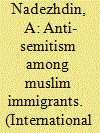

|
|
|
|
|
| Summary/Abstract |
EXPERTS have for years been pointing to mounting xenophobic, anti-immigrant, and radical sentiments among the population of Europe. However, recently it is not only refugees and economic migrants from the Middle East and North Africa (MENA region) who have been facing hostility but also Jews who have lived in Europe permanently and have been integrated into European society. Usually, European anti-Semitism has been blamed on right-wing extremists and radicals, especially those in Hungary and Poland.1 There occur random instances of trivial anti-Semitic behavior, for example at school or in companies, that are not investigated or taken into account in police statistics.
|
|
|
|
|
|
|
|
|
|
|
|
|
|
|
|
| 2 |
ID:
187503
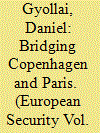

|
|
|
|
|
| Summary/Abstract |
Integrating the discursive and practice-based approach to securitisation, this article explores how the police function as the audience of securitising discourse. Taking the Hungarian case of border control, it looks into how the police accept and buy into anti-immigrant discourses of the political elite. Based on a questionnaire survey of Hungarian police officers, it demonstrates the potential of discursive legitimation in shaping officers’ understanding of mass migration. It describes the ways in which attitudes and hence, arguably, practice can be conditioned by securitising discourse. The overall aim of the article is to advance the understanding of the narrative dimension of power struggles between police and the political elite, and how that structures the field of border security. Critical security scholars have pointed out that police filter securitising discourse based on their professional dispositions and preferences. However, the Hungarian case seems to suggest that discourse may, in fact, influence dispositions themselves.
|
|
|
|
|
|
|
|
|
|
|
|
|
|
|
|
| 3 |
ID:
163823
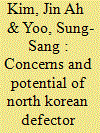

|
|
|
| 4 |
ID:
102948
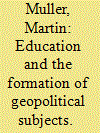

|
|
|
|
|
| Publication |
2011.
|
| Summary/Abstract |
Despite the crucial role of schools and universities in shaping the worldviews of their students, education has been a marginal topic in international relations. In a plea for more engagement with the power and effects of education, this paper analyzes the interplay of discipline and knowledge in the formation of geopolitical subjects. To this end, it employs material from ethnographic research at the Moscow State Institute of International Relations, the premier university for educating future Russian elites in the field of international relations. The paper draws on Foucault to chart the ensemble of disciplinary practices producing "docile bodies" and objective knowledge and traces how these practices are bound up with the geopolitical discourse of Russia as a great power: while they fashion the great power discourse with objectivity, disruptions in the discourse also disrupt disciplinary practices.
|
|
|
|
|
|
|
|
|
|
|
|
|
|
|
|
| 5 |
ID:
161585
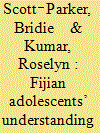

|
|
|
|
|
| Summary/Abstract |
Pacific Island countries are particularly vulnerable to future manifestations of climate change due to high coastline‐to‐land‐area ratios, and high dependence of inhabitants on natural ecosystems. While everyone in the Pacific Islands should participate in climate change adaptation activities, it is the young people, given they are the generation likely to not only bear the burden of climate change, but to lead and live effective climate change adaptation activities and strategies specific to their region, the involvement of youth is critical. Pacific Island youths are often marginalised within traditional decision‐making hierarchies, therefore they are typically excluded from participating in meaningful discussions at community and government levels. Discussions were held with 30 adolescents aged 14–18 years in Fiji to explore knowledge and experiences regarding climate change. Participants revealed their dismay at their inability to talk to family – who they consider are not doing enough – about what they consider as appropriate responses to climate change, recommending the help of an authoritative outsider who could speak to their community leaders and family. Discussions also revealed that Fijian youth could not distinguish between changes in the climate and normal weather events, attesting to the importance of climate‐change education and awareness‐raising efforts within the Pacific Islands more generally.
|
|
|
|
|
|
|
|
|
|
|
|
|
|
|
|
| 6 |
ID:
099135
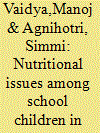

|
|
|
| 7 |
ID:
179342
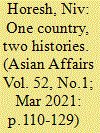

|
|
|
|
|
| Summary/Abstract |
The 19th Chinese Communist Party (CCP) Congress, held in October 2017, enshrined not just Xi Jinping's grip on power. It also re-coated its ideology with a medley of Socialist and traditionalist buzz words that had been marginalized in the 1980s. During the height of the reform era, these increasingly made way for ideas borrowed from market economies. Predictably enough, the ideological ferment surrounding the 19th Party Congress has since also played out in the realm of education. This article examines in detail the most current history textbooks used in PRC classrooms to construe China's pre-Imperial and Imperial past. To that end, included in my exploration will not just be changing PRC attitudes to the Chinese past, but also PRC instruction of world history from antiquity to the early modern era. In passing, I will also compare the school material with the latest authoritative Western scholarly studies of the same topics by way of eliciting how PRC official historical narratives of events preceding the 20th century diverge from Western ones.
|
|
|
|
|
|
|
|
|
|
|
|
|
|
|
|
| 8 |
ID:
173276
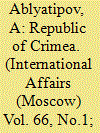

|
|
|
|
|
| Summary/Abstract |
THE FOLLOWING STATEMENT made by Russian President Vladimir Putin in his Address to the Russian Federal Assembly in connection with the accession of the Republic of Crimea to the Russian Federation and the formation of new constituent entities within the Russian Federation (March 18, 2014) was met with applause: "We have great respect for people of all ethnic groups living in Crimea. It is their common home, their motherland, and it would be right for Crimea - I know Crimeans support this - to have three equal official languages: Russian, Ukrainian, and Crimean Tatar."
|
|
|
|
|
|
|
|
|
|
|
|
|
|
|
|
| 9 |
ID:
101300
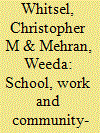

|
|
|
|
|
| Publication |
2010.
|
| Summary/Abstract |
Youth in Tajikistan and Afghanistan struggle to attend secondary school. Educational research indicates that individual, family and community factors are key determinants of educational participation. The question that dominated past research was whether family or community variables had a greater influence on educational participation. Instead, this article asks how the community context shapes the influence of family characteristics on educational participation. Using recent data from the Tajikistan Living Standards Measurement Survey and Afghanistan National Risk and Vulnerability Assessment, we demonstrate ways that school availability, school costs and work opportunities shape individual and family determinants of youth educational participation in Tajikistan and Afghanistan. We find that there is greater divergence between communities in Tajikistan than in Afghanistan.
|
|
|
|
|
|
|
|
|
|
|
|
|
|
|
|
| 10 |
ID:
106523
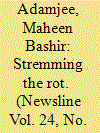

|
|
|
| 11 |
ID:
158469
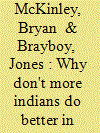

|
|
|
|
|
| Summary/Abstract |
American Indian/Alaska Native education – the training for life of children, adolescents, and adults – has been locked in battle for centuries with colonial schooling, which continues to the present day. Settler societies have used schools to “civilize” Indigenous peoples and to train Native peoples in subservience while dispossessing them of land. Schools are the battlegrounds of American Indian education in which epistemologies, ontologies, axiologies, pedagogies, and curricula clash. In the last century, Native nations, communities, parents, and students have fought tenaciously to maintain heritage languages and cultures – their ways of being in the world – through Indigenous education and have demanded radical changes in schools. Contemporary models of how educators are braiding together Indigenous education and Indigenous schooling to better serve Native peoples provide dynamic, productive possibilities for the future.
|
|
|
|
|
|
|
|
|
|
|
|
|
|
|
|
|
|
|
|
|